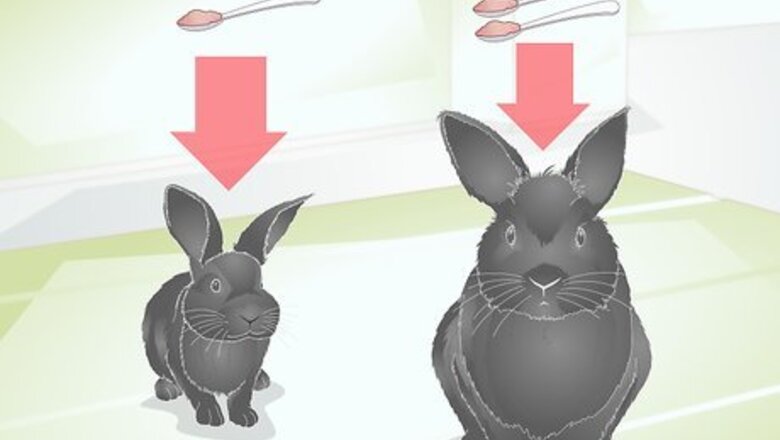
views
Giving Your Rabbit Healthy Treats
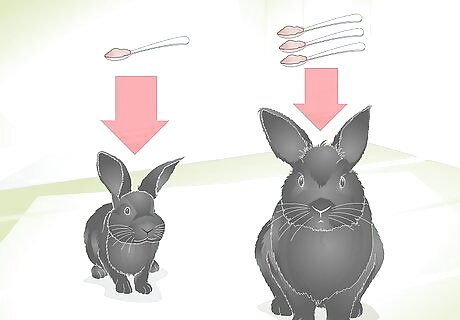
Keep treats in small amounts. For a rabbit, this means about a tablespoon of food. Give a small rabbit this amount once a day, while a larger rabbit can have a small treat up to three times a day. Giving small amounts allows your rabbit to digest whatever healthy treats you give it. Because a rabbit's digestive system is so sensitive, you need to be cautious about overwhelming it with new and complex foods that are difficult to break down.
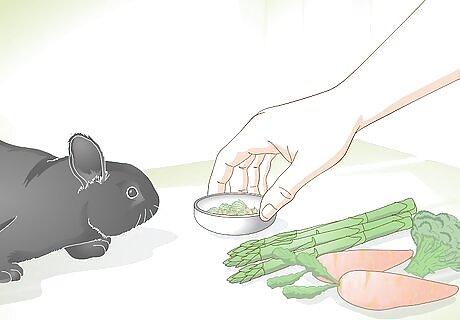
Feed your rabbit an array of vegetables. Make sure to wash or thoroughly rinse the vegetables before giving them to your rabbit. Also make sure you are not giving spoiled vegetables to your rabbit, as these can make a rabbit sick. Some good vegetables to feed to your rabbit include: Asparagus Beet roots Carrots Celery Cucumbers Bell peppers Brussels sprouts Green beans Turnip roots Kohlrabi Pea pods Broccoli Squash Pumpkin
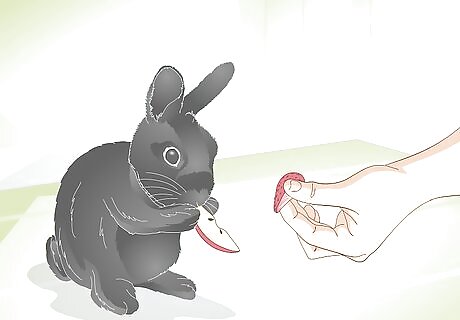
Give your rabbit small amounts of fruit. Fruits, although delicious, are high in sugars. Therefore, it is best to limit these treats to only once or twice a week in small amounts, meaning one tablespoon for a small rabbit or two tablespoons for a large rabbit. Good fruit choices include: Raspberries Strawberries Blueberries Melon Apples Kiwi Pineapple Papaya Pear Plum Peach
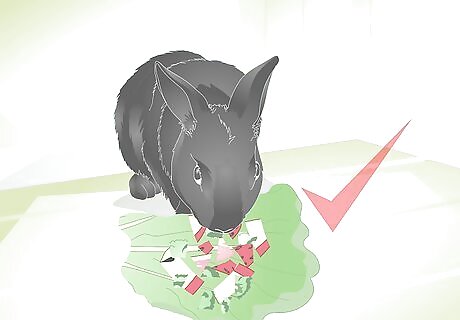
Give your rabbit a wide array of healthy treats. You do not want to give only one kind of treat, as this could give your rabbit too much of one kind of nutrient. For example, don’t just feed one kind of fruit or vegetable every day. Mix them up so that your rabbit gets a variety of nutrients but continue to keep to the recommended amount. However, introduce any new food gradually. Your rabbit does need an array of foods but its digestive system needs to get used to digesting them. This is done by adding new foods to the rabbit's diet very gradually.
Avoiding Unhealthy Treats
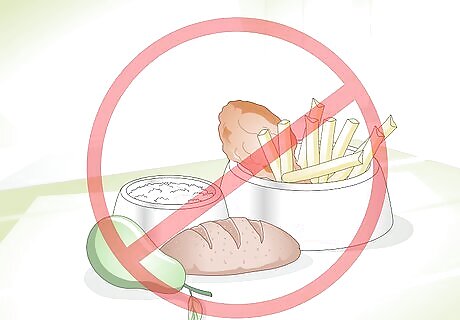
Avoid giving your rabbit foods that are low fiber, high sugar, or high fat. Obviously, you should never give your rabbit junk food or meat of any kind, as rabbits are herbivores. In addition, avoid giving it food that low in fiber or high in sugar and fat, such as bread, rice, potatoes, and avocado. These foods can severely disrupt your rabbits digestive process.
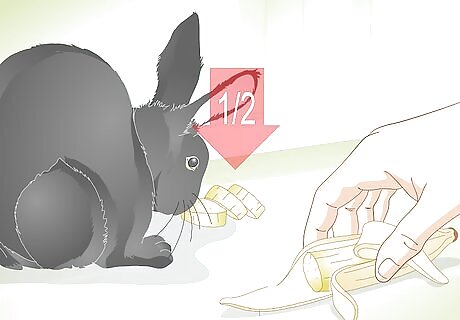
Be very careful about the amount of high sugar fruits you give your rabbit. Sugar can disrupt the rabbit’s intestinal flora (bacteria), causing diarrhea. For example, you can feed a small amount of banana or grapes to your rabbit but give it half the amount as you would other fruits due to their extremely high sugar contents. In the case of rabbit's, diarrhea is a very serious problem that can cause your rabbit to get sick and die very quickly.
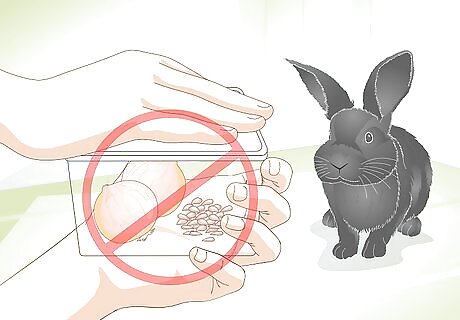
Keep foods that are toxic to rabbits away from your pet. There is a wide array of plants that are actually toxic to rabbits. In nature, wild rabbits usually steer clear of them. However, a pet rabbit may be lured into trying something toxic to it if you present it like food. Some things that are toxic to rabbits include (but are not limited to): Apple seeds Onion Tomato plants Rhubarb leaves Wild carrots Citrus peels
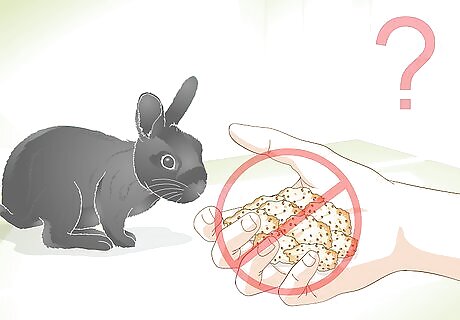
Don't feed your rabbit anything you are unsure of. If you are unsure whether a certain fruit or vegetable is good for your rabbit, then just avoid giving it until you find out. Remember that it is always better to be safe than sorry when it comes to a rabbit's digestive system.
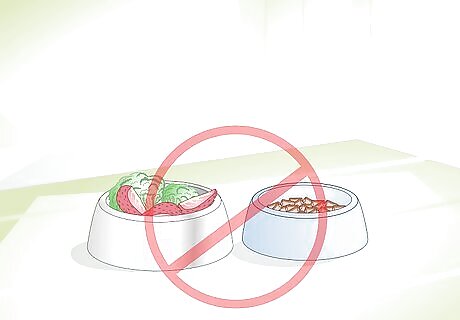
Do not make treats the majority of your rabbit's diet. Rabbits need an appropriate diet to make sure their digestive system works correctly. An unbalanced diet may make them sick or could even kill them. The bulk of a rabbit’s diet should consist of clean water, fresh hay (that is available to the rabbit at all times), pellets (in limited amounts for adults) and fresh, leafy greens (also given in limited amounts). Consider vegetables other than leafy greens a treat and leafy greens themselves as a necessary component of your rabbits diet that needs to be given in moderation. Leafy greens include lettuce, spinach, beet greens, Swiss chard, and a variety of others.
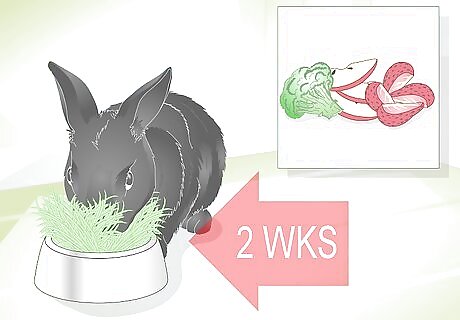
Wait until a rabbit is old enough to eat hay before giving it treats. Basically, you should not give a new born baby rabbit any treats. Ideally, the rabbit will have been on hay for at least two weeks before starting to give it treats. This will allow the little rabbit's digestive system to adjust to digesting hay and its digestive enzymes will be established enough to start digesting fruits and vegetables.


















Comments
0 comment